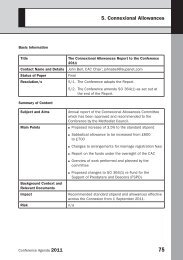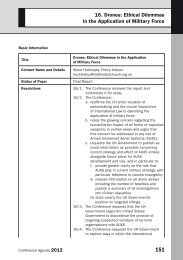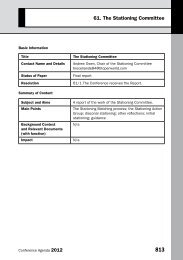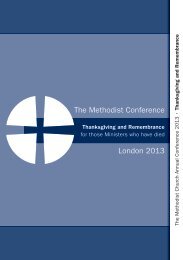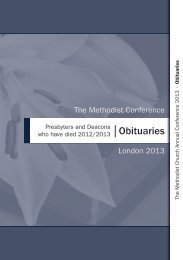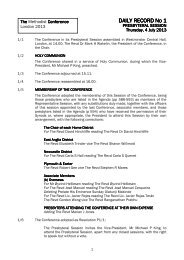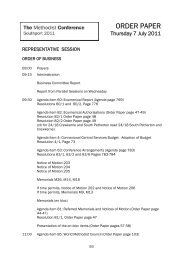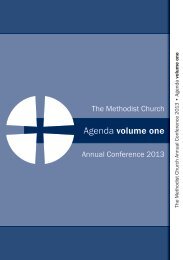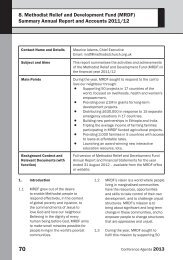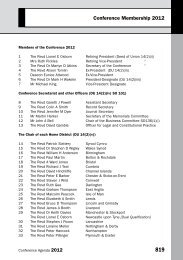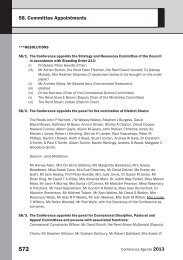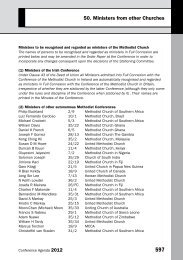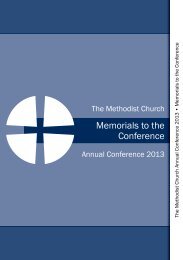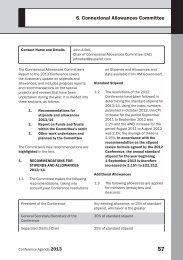Agenda Volume 3 - Methodist Conference
Agenda Volume 3 - Methodist Conference
Agenda Volume 3 - Methodist Conference
Create successful ePaper yourself
Turn your PDF publications into a flip-book with our unique Google optimized e-Paper software.
57. The Fruitful Field Project<br />
annually to the <strong>Conference</strong>, including<br />
within the report an assessment<br />
of the performance, efficiency and<br />
effectiveness of the Network in<br />
meeting its purposes and goals<br />
and an outline of its strategies and<br />
planned activities; (b) reporting<br />
annually to the <strong>Methodist</strong> Council,<br />
and working with the <strong>Methodist</strong><br />
Council and the Strategy and<br />
Resources Committee on all financial<br />
and human resource matters; (c)<br />
working collaboratively with the<br />
Ministries Committee when reviewing<br />
the purposes, values, goals and<br />
direction of the Network and when<br />
developing the strategies and<br />
planned activities of the Network;<br />
(d) demonstrating how the Network’s<br />
processes and activities enable<br />
accessibility and responsiveness,<br />
and enable the Network’s activities<br />
and ventures to be developed<br />
through interactive relationships and<br />
in dialogue with local communities<br />
– their diverse and continually<br />
developing contexts, needs and<br />
aspirations; (e) overseeing a<br />
communications plan which ensures<br />
that accurate and timely information<br />
is given to everyone with an interest<br />
in the work of the Network.<br />
251 Most of these responsibilities are<br />
not new responsibilities within the<br />
life of the <strong>Conference</strong>, the <strong>Methodist</strong><br />
Council and various institutions,<br />
colleges and centres. However, they<br />
are currently shared across a number<br />
of governing bodies and management<br />
committees, and are exercised<br />
without the guiding framework<br />
provided by clearly articulated and<br />
shared purposes, values and goals<br />
and a clear sense of direction.<br />
252 The Committee was assisted<br />
by reflections shared during the<br />
consultation period about the<br />
feasibility of moving from the existing<br />
fragmented pattern to a governance<br />
system which expresses greater<br />
connexionalism, collegiality and<br />
coherence. A submission made<br />
by a learning institution during<br />
the consultation period noted the<br />
possibility of establishing “a single<br />
council setting strategic direction,<br />
consolidated financial accounts...,<br />
shared resources and common<br />
procurement processes.” Another<br />
learning institution noted that<br />
“we see the logic and theological<br />
rationale of a connexional church<br />
structuring its resources, shaping its<br />
pathways and deploying its people<br />
in connexional ways... While we<br />
would wish that the dispersion of<br />
resources led naturally to strong and<br />
warm collaborative relationships our<br />
experience is that the Church and its<br />
institutions (not just colleges) quickly<br />
adopt territorial, competitive and<br />
separatist mentalities. We recognise<br />
that at its best a clearer connexional<br />
model could aid the development of<br />
a network of people and places that<br />
would work together; however, without<br />
sufficient attention to issues of power<br />
and authority the outcome at its worst<br />
could be a model of command and<br />
control, with the ‘centre’ dominating<br />
the ‘margins’.” The Committee is<br />
confident that the establishment of a<br />
750 <strong>Conference</strong> <strong>Agenda</strong> 2012



